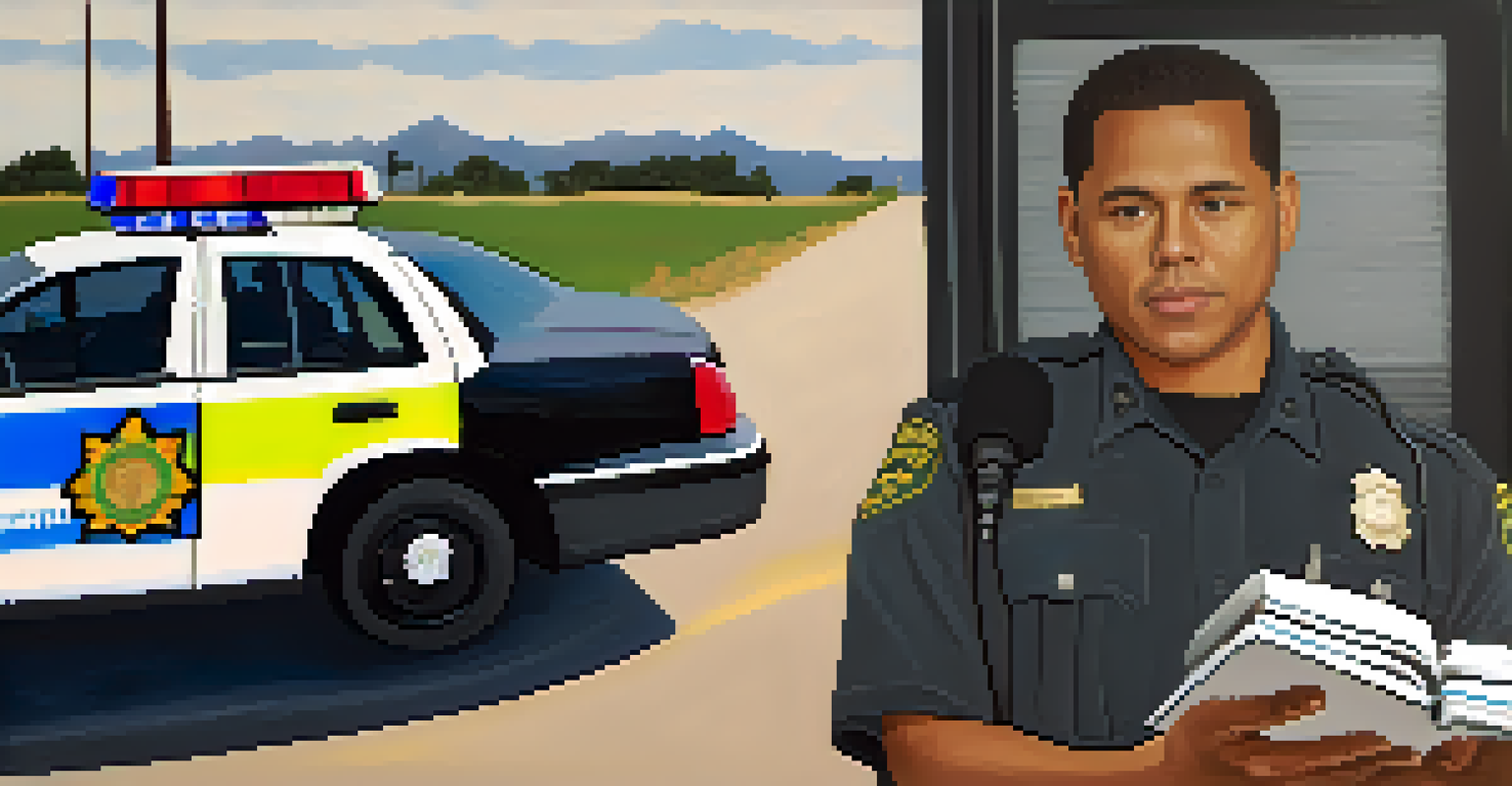Effects of Marijuana Legalization on Drug Task Forces

Understanding Marijuana Legalization and Its Scope
Marijuana legalization refers to the process of making the use, sale, or cultivation of marijuana legal under state law. This movement has gained traction across the United States, with many states allowing recreational and medicinal use. As laws evolve, the implications for law enforcement, particularly drug task forces, become increasingly significant.
The measure of intelligence is the ability to change.
The changing landscape of marijuana laws often leads to confusion regarding what is legal and what is not. Drug task forces, responsible for combating illegal drug activity, must adapt to these new regulations. This adjustment can create challenges as they navigate both enforcement and community expectations.
Understanding the specifics of legalization is crucial for drug task forces. For instance, some states have strict regulations on sales and possession limits, while others have looser guidelines. This variety means that drug task forces must stay informed and flexible in their operations.
Shifts in Focus for Drug Task Forces Post-Legalization
With marijuana becoming legal in many areas, drug task forces are shifting their focus from marijuana-related offenses to more serious crimes. This transition is essential to ensure that resources are directed where they are most needed, such as combating trafficking of harder drugs like opioids or methamphetamines. The shift not only makes practical sense but also aligns with public sentiment toward marijuana.

As task forces redirect their efforts, they may find that the nature of drug-related crime is changing. For example, while marijuana use may increase, the associated violent crime rates often decrease in areas where it has been legalized. This phenomenon presents an opportunity to build community relationships based on trust rather than enforcement.
Shifting Focus of Drug Task Forces
Drug task forces are redirecting their efforts from marijuana-related offenses to more serious drug crimes, aligning resources with community needs.
However, this shift requires careful planning and training. Drug task forces must prepare personnel to handle new types of drug-related issues, focusing on education and prevention rather than punitive measures for marijuana use. This realignment can foster a more supportive environment within communities.
Resource Allocation Challenges for Drug Task Forces
Legalization brings unique challenges for resource allocation within drug task forces. With fewer marijuana-related arrests, funds and personnel may need to be reallocated to tackle other pressing issues. This requires strategic planning to ensure that the transition is smooth and that task forces remain effective.
Change is the law of life. And those who look only to the past or present are certain to miss the future.
Some task forces may find themselves facing budget constraints due to reduced drug seizure revenues, which are often used to fund operations. As marijuana becomes legal, the financial dynamics change, leading to potential shortfalls that can impact overall effectiveness. It’s crucial for these forces to adapt their funding strategies accordingly.
Additionally, task forces might need to invest in training programs that focus on new drug trends rather than marijuana enforcement. This shift can lead to a more educated and versatile workforce, ultimately helping to address the evolving landscape of drug-related crime.
Community Relations in the Era of Legal Marijuana
The legalization of marijuana has changed the dynamics between drug task forces and the communities they serve. Many residents now view marijuana as a legitimate business rather than a criminal issue. This shift can enhance community relations, making residents more likely to cooperate with law enforcement on other issues.
Effective communication is key in this new environment. Drug task forces that engage with their communities transparently and openly can build trust and foster collaboration. This relationship can lead to more effective policing and community-led initiatives aimed at preventing drug abuse.
Training Needs for Officers
Law enforcement officers require specialized training to navigate the complexities of legalized marijuana, ensuring effective and informed interactions.
However, it’s important to remember that not all community members support legalization. Task forces must balance these differing perspectives while promoting safety and well-being. Listening to community concerns and addressing them proactively can help maintain a positive relationship.
Training Needs for Officers in Legalized Marijuana States
As marijuana legalization spreads, there’s an increasing need for specialized training among law enforcement officers. Understanding the legal boundaries of marijuana use and distribution is critical for effective enforcement. This training helps officers distinguish between legal and illegal activities related to marijuana.
Additionally, education on the effects of marijuana and its potential risks can prepare officers for interactions with the public. Officers who are informed about the substance can respond more effectively to incidents involving marijuana, ensuring that they approach situations with knowledge rather than preconceived notions.
Training programs can also include components on community engagement, emphasizing the importance of building rapport with residents. This holistic approach can foster a more community-focused law enforcement strategy, aligning with the evolving attitudes toward marijuana use.
The Role of Drug Task Forces in Public Health Initiatives
With the decline in marijuana-related offenses, drug task forces have a unique opportunity to pivot towards public health initiatives. By collaborating with health organizations, they can address issues like addiction recovery and substance abuse education. This proactive approach can significantly benefit communities grappling with drug-related challenges.
Engaging in public health initiatives can also enhance the reputation of drug task forces. By positioning themselves as partners in health rather than solely enforcers, they can foster a more positive image and build trust within the community. This shift is essential in an era where community cooperation is paramount.
Embracing Public Health Initiatives
With fewer marijuana-related arrests, drug task forces have the opportunity to engage in public health initiatives, fostering community trust and addressing substance abuse.
Moreover, focusing on public health can lead to more effective long-term solutions for drug-related issues. By addressing the root causes of addiction and providing resources for recovery, task forces can play a crucial role in creating healthier communities.
Future Considerations for Drug Task Forces Amid Legalization
As the trend of marijuana legalization continues, drug task forces will need to remain adaptable and forward-thinking. They must anticipate changes in laws and public attitudes, ensuring that they are prepared to respond effectively. This foresight can help them navigate the complexities of drug enforcement in a rapidly evolving landscape.
Future considerations may also include how to handle interstate differences in marijuana laws. Task forces must be aware of how legalization varies from state to state, as this can impact enforcement strategies and resource allocation. Coordination with other agencies will be vital to ensure consistency and effectiveness.

Ultimately, drug task forces have the potential to redefine their roles in society. By embracing change and focusing on community health and safety, they can emerge as leaders in the fight against drug abuse in a way that resonates with the public.